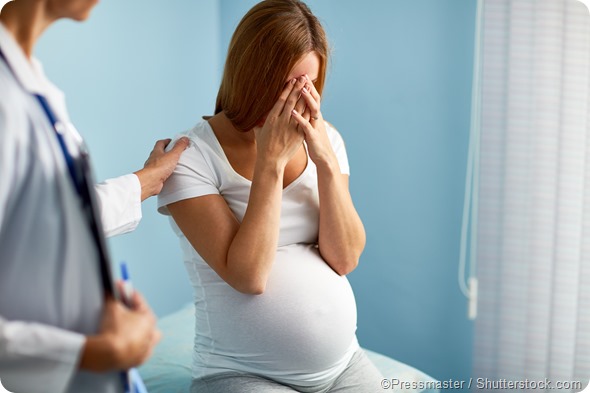Prenatal or Antenatal Depression

Prenatal or antenatal depression refers to the development of five or more major depressive symptoms during pregnancy. It has been found to affect approximately 13 percent of pregnant women. Prenatal depression adversely affects the woman’s recovery following childbirth, since antenatal depression is the single largest predictor of postnatal depression.
This in turn has a detrimental effect upon the woman’s own health, the health and upbringing of the child, as well as on the health of the family as a whole. Paternal postnatal depression, the occurrence of other postnatal mental disorders such as obsessive-compulsive disorder (OCD) and hyperactivity, cognitive defects and behavioral impairment on the part of the child have been linked to antenatal depression.

Risk factors
- Several studies have identified the major risk factors responsible for much antenatal depression. These include:
- Poor self-image related to hormonal fluctuations, changing body shape, and physical stress
- Anxiety before childbirth
- Low levels of social and family support
- Negative thinking patterns
- Major stressful changes in life
- Financial stress or poverty
- A history of abuse
Other Factors Include:
- Young age
- A personal or family history of depression or mental illness
- A history of difficult pregnancy or delivery
- Marital stress
- Substance abuse
Hormonal changes are many and drastic, occurring throughout the course of a woman’s reproductive life. These changes are thought to underlie many mood swings and depressive symptoms, especially as many of them are also mirrored in men during this period. For instance, low testosterone levels occur starting from early pregnancy and lasting well into the postpartum period. When these are excessively reduced in men, there is a greater association with male depression.
Antenatal depression is important in that it mediates the effects of the seven primary risk factors listed above, in determining up to 66 percent of the causation behind postnatal depression. In other words, these risk factors promote antenatal depression, which in turn acts as the single major determinant of postnatal depression.
Complications
Women who have antenatal depression may experience more serious complications during pregnancy and childbirth. These include:
- Failure to eat well
- Lack of required weight gain
- Sleep disturbances
- Irregular prenatal visits
- Poor compliance with medical advice
- Substance abuse during pregnancy
- Complicated labor and delivery
- Low-birth-weight babies
- Preterm labor and premature babies
- Higher risk of postpartum depression
When to seek help
If you have any of these symptoms or behaviors, and they are worsening or persisting despite your desire to change them, you would be better off consulting a healthcare professional for help. This is also wise if you find it difficult to cope with routine tasks, everyday chores, or your daily work. Another red flag is having repeated thoughts about harming yourself or your unborn baby. If you find that you are neglecting your health, you should realize that it is time to get good help and visit your doctor or healthcare provider.
Why parents do not seek help
Common fears which inhibit women from sharing their depressive symptoms include:
- The fear of being thought or declared unfit parents
- The fear that they will not be able to keep the baby
- The fear that they are somehow abnormal for not fitting in with the perceived trend to be happy and contented mothers
Management
Antenatal depression can and should be treated. Expectant mothers could try following the tips below to help improve their emotional health:
- Get adequate rest and good food
- Adjust your chores to your energy level
- Get time outside every day
- Ask for help with housework or other jobs as required without feeling guilty
- Continue to cultivate your interests by putting aside some time for yourself once in a while
- Grow your marital relationship through date nights and special times with your partner
- Tell your partner if you feel anxious, insecure, or unsupported
- Join other more experienced and friendly mothers to find out how you can expect life to be after childbirth. Knowledge empowers and reassures you
- Avoid making unnecessary major changes in your life or schedule, and plan well in advance for those which can’t be helped
If major depression sets in, both psychotherapy and medication may be used, often with good results.
References
- https://www.womenshealth.gov/publications/our-publications/fact-sheet/depression-pregnancy.html
- https://www.ncbi.nlm.nih.gov/pubmed/15234824
- https://www.ncbi.nlm.nih.gov/pubmed/18067974
- https://www.ncbi.nlm.nih.gov/pubmed/21130548
- https://www.ncbi.nlm.nih.gov/pmc/articles/PMC2375874/
Further Reading
- All Prenatal Depression Content
- Prenatal and Postnatal Depression: Is There a Link?
- Pre- and Postnatal Anxiety
- Support for Prenatal and Postnatal Anxiety
- Treatment for Pre and Postnatal Anxiety
Last Updated: Feb 27, 2019

Written by
Dr. Liji Thomas
Dr. Liji Thomas is an OB-GYN, who graduated from the Government Medical College, University of Calicut, Kerala, in 2001. Liji practiced as a full-time consultant in obstetrics/gynecology in a private hospital for a few years following her graduation. She has counseled hundreds of patients facing issues from pregnancy-related problems and infertility, and has been in charge of over 2,000 deliveries, striving always to achieve a normal delivery rather than operative.
Source: Read Full Article




